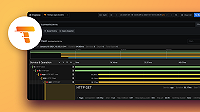Menu
Caution
Grafana Alloy is the new name for our distribution of the OTel collector. Grafana Agent has been deprecated and is in Long-Term Support (LTS) through October 31, 2025. Grafana Agent will reach an End-of-Life (EOL) on November 1, 2025. Read more about why we recommend migrating to Grafana Alloy.
Important: This documentation is about an older version. It's relevant only to the release noted, many of the features and functions have been updated or replaced. Please view the current version.
Open source
blackbox_config
The blackbox_config block configures the blackbox_exporter
integration, which is an embedded version of
blackbox_exporter. This allows
for the collection of blackbox metrics (probes) and exposing them as Prometheus metrics.
Quick configuration example
To get started, define Blackbox targets in Grafana Agent’s integration block:
yaml
metrics:
wal_directory: /tmp/wal
integrations:
blackbox:
enabled: true
blackbox_targets:
- name: example
address: http://example.com
module: http_2xx
blackbox_config:
modules:
http_2xx:
prober: http
timeout: 5s
http:
method: POST
headers:
Content-Type: application/json
body: '{}'
preferred_ip_protocol: "ip4" Full reference of options:
yaml
# Enables the blackbox_exporter integration, allowing the Agent to automatically
# collect system metrics from the configured statsd server address
[enabled: <boolean> | default = false]
# Sets an explicit value for the instance label when the integration is
# self-scraped. Overrides inferred values.
#
# The default value for this integration is inferred from the agent hostname
# and HTTP listen port, delimited by a colon.
[instance: <string>]
# Automatically collect metrics from this integration. If disabled,
# the blackbox_exporter integration will be run but not scraped and thus not
# remote-written. Metrics for the integration will be exposed at
# /integrations/blackbox_exporter/metrics and can be scraped by an external
# process.
[scrape_integration: <boolean> | default = <integrations_config.scrape_integrations>]
# How often should the metrics be collected? Defaults to
# prometheus.global.scrape_interval.
[scrape_interval: <duration> | default = <global_config.scrape_interval>]
# The timeout before considering the scrape a failure. Defaults to
# prometheus.global.scrape_timeout.
[scrape_timeout: <duration> | default = <global_config.scrape_timeout>]
# Allows for relabeling labels on the target.
relabel_configs:
[- <relabel_config> ... ]
# Relabel metrics coming from the integration, allowing to drop series
# from the integration that you don't care about.
metric_relabel_configs:
[ - <relabel_config> ... ]
# How frequent to truncate the WAL for this integration.
[wal_truncate_frequency: <duration> | default = "60m"]
#
# Exporter-specific configuration options
#
# blackbox configuration file with custom modules.
# This field has precedence to the config defined in the blackbox_config block.
# See https://github.com/prometheus/blackbox_exporter/blob/master/example.yml for more details how to generate custom blackbox.yml file.
[config_file: <string> | default = ""]
# Embedded blackbox configuration. You can specify your modules here instead of an external config file.
# See https://github.com/prometheus/blackbox_exporter/blob/master/CONFIGURATION.md for more details how to specify your blackbox modules.
blackbox_config:
[- <modules> ... ]
# List of targets to probe
blackbox_targets:
[- <blackbox_target> ... ]
# Option to configure blackbox_exporter.
# Represents the offset to subtract from timeout in seconds when probing targets.
[probe_timeout_offset: <float> | default = 0.5]blackbox_target config
yaml
# Name of a blackbox_target
[name: <string>]
# The address of the target to probe
[address: <string>]
# Blackbox module to use to probe
[module: <string> | default = ""]Was this page helpful?
Related resources from Grafana Labs
Additional helpful documentation, links, and articles:

Getting started with tracing and Grafana Tempo
In this webinar, we'll show you how to get started setting up Grafana Tempo, our open source, easy-to-use and high-volume distributed tracing backend.

GrafanaCON 2024 Keynote Recap
Catch up on GrafanaCON 2024 highlights! Explore Grafana 11 features, LGTM Stack innovations, and community achievements in this recap webinar.

Getting started with the Grafana LGTM Stack
In this webinar, we’ll demo how to get started using the LGTM Stack: Loki for logs, Grafana for visualization, Tempo for traces, and Mimir for metrics.
